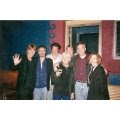Inshtatheamba
Friday, January 07, 2005
With the January 25th release of two albums by Omaha's Saddle Creek recording artist Conor Oberst [I'm Awake, It's Morning - and - Digital Ash in a Digital Urn] fans around the world recognize the name,‘Bright Eyes’ as the musical moniker Oberst performs under.
Fewer will recognize the name Mato Nanji: leader of the BMG blues rock recording act Indigenous. Nanji’s Americanize name translates to Standing Bear: a name quite a few Omahan’s will recognize as the name of a local recreational dam site and a prominent bridge in North-Central Nebraska. Nanji, a Nakota Sioux is a direct descendent of the historical Standing Bear, a Ponca Sioux.
Few, if any, will recognize the name Susette LaFlesche but all three of these names played a role in one of our nation's most significant Civil Rights cases that occurred 125 years ago.
In March of 1879 Ponca (Sioux) Tribal Chief Standing Bear was arrested by a reluctant General George Crook. Prior to this date the Ponca’s had been forcibly relocated from their homeland in North Central Nebraska (near what is now Valentine) to the Indian reservations in Oklahoma. This trek is now referred to as, The Trail of Tears.’ Due to the severe living conditions more than 500 members (over a third) of the tribe died including Standing Bears son. At the dying request of his son Standing Bear and a handful of tribal members walked more than 500 miles back to Nebraska in January of 1879 to bury his son in the tribe’s native homeland.
Crook was ordered to arrest Standing Bear and once again forcibly return him to the distant reservation. While he followed his orders it would be reveled, after his death, that Crook also secretly meet with Omaha Herald Editor Thomas Tibbles to help the Indians. (The Omaha Herald had not yet merged to form the now Omaha World Herald). “Tibbles idea was this: that the newly passed 14th Amendment to the U.S. Constitution guaranteed equal protection under the law to all persons. Since it clear that the government had no right to hold a white person in captivity unless that person had been convicted of a crime, it therefore had no right to hold the Poncas on a reservation against their will. Standing Bear could therefore petition a judge for a writ of habeas corpus, a type of legal order which would require the army to either prove the Poncas guilty of a crime, or to release them.” [pg 169]
Tibbles talked a young lawyer named John L. Webster to accept the case “pro bono” or without pay. Interestingly Creighton University’s law school now abuts Webster Street. Webster then sought the assistance of A.J. Poppleton. Somewhat verbose Poppleton’s closing arguments took a mere four hours while Webster’s lasted six hours. Opposing U.S. District Attorney Genio M Lambertson (the only one of the three to NOT have an Omaha street named after him) took five hours to sum up his case.
In a courtroom at Fort Omaha (30th & Fort), dressed in full Native regalia Standing Bear would deliver an oft-misquoted speech to the court in his own defense. Sitting Judge Elmer Dundy would decide that Standing Bear, and therefore all Native Americans, were “a person” and thereby have rights within the American Judisical system. This would mean that the Government could no longer detain these peoples on reservations against their will.
“Later that year Tibbles resigned his post at the Herald to go East on a speaking tour with Standing Bear. The two of them hoped to raise awareness, create sympathy for the Indians, and see that the Poncas got their land back. Accompanying them was a remarkable young woman named Susette LaFlesche, daughter of the chief of the Omahans. Partly of French ancestry, “Susette LaFlesche” was the woman’s “white” name. She had another: Inshtatheamba, meaning Bright Eyes. Beautiful, educated, and highly intelligent Bright Eyes served not only as Standing Bear’s interpreter, but as a powerful speaker in her own right. Eventually she and Tibbles were married.” [pg 177]
While free to live where they want, eventually the Ponca did receive their land back although the tribe remains divided between Nebraska and Oklahoma to this day.
Book referred to: ‘A Dirty, Wicked Town. Tales of 19th Century Omaha’ David L. Bristow. Caxton Press.
Monday, January 21, 2008
Subscribe to:
Post Comments (Atom)











No comments:
Post a Comment